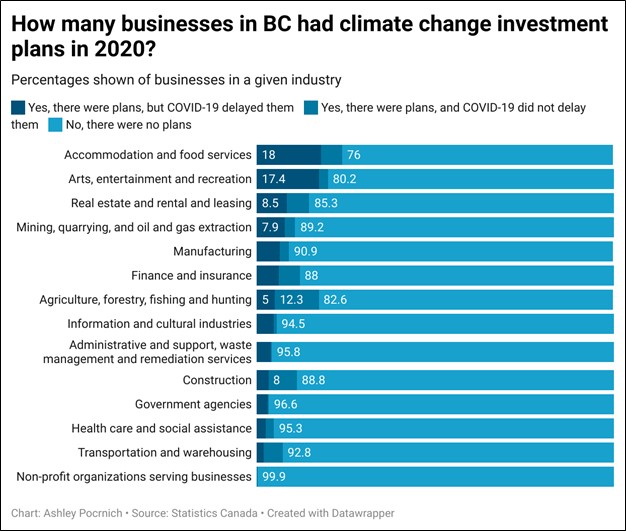by Ashley Pocrnich
Surrey for Future founder Allison Richardson speaks on how the pandemic affected her capability to advocate for the environment

Climate action groups in B.C. like Surrey for Future found themselves in completely new waters in 2020 when the COVID-19 pandemic swept across the world. Like many others, they were forced to alter their goals for the year and the very way they thought about activism.
“April 2020 was supposed to be a big month for climate action across the board, but it all had to shift because of COVID,” founding member Allison Richardson said. “Things were changing from day-to-day.”
For others outside of activism groups, the COVID-19 pandemic didn’t so much derail climate change engagement as it delayed it. Statistics Canada shows a higher percentage of B.C. businesses during 2020 had climate change investment plans that had to be put off than those able to carry them out. A breakdown of industries can be seen in the above graph.
The provincial government reports 1,630 different wildfires burned through 869,172 hectares in B.C. this year, up from 670 last year and around 300 above the 10-year average. During the peak of this wildfire season air quality in many interior cities was ranked “very unhealthy,” and projections suggest if the average global temperature continues to rise the number of fires will too.
Groups like Surrey for Future highlight the urgent need for climate action in all levels of government and recent tragedies like the burning of the town of Lytton has brought it to the forefront for the B.C public.
Surrey for Future began holding their meetings over Zoom instead of in-person at the start of the pandemic, along with many other groups, but they lost a number of members after the switch.
In-person organizing is vital for climate action, as Richardson says, and going to an MP’s office or attending a city council meeting can remind elected officials how many people want to see change from them. Their ability to do this, what she calls “the core of activism,” was also stifled by the pandemic.
The strategies Surrey for Future uses now include “banner drops,” when banners are hung with protest slogans in public places like what they did to Surrey Centre MP Randeep Sarai’s office in March.
“That creativity is great. We have more tactics and more things that we can think of doing but it’s also a challenge to be nimble and creative all the time when the things you kind of relied on in the past don’t work,” Richardson said.
Policy changes are also moving forward at a new pace. The city of Surrey gave the final approval last week to carry out a ban on single-use plastics, with enforcement starting early 2022.
The pandemic has caused a spike in single-use plastics worldwide. The B.C. government gave municipal governments the ability to use these bans in July, but Surrey was one of the first to act.
Richardson is still looking forward to how Surrey for Future can adapt to new methods of activism.
“It’s kind of an ongoing challenge to develop new ways to get people involved and get our message across to the politicians at all different levels,” she said, “to reach out to new members to let people in Surrey know that we are here and we’re doing this.”
This article was written as part of JRNL 4250, a senior class about politics and journalism. Climate change was one political issue reported on by the students, as part of the Climate+ Challenge.